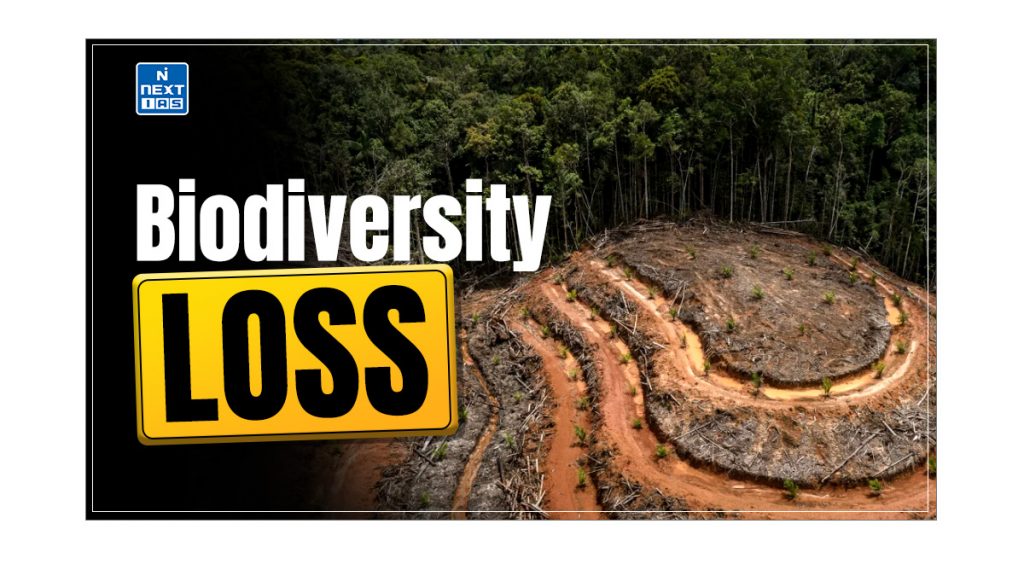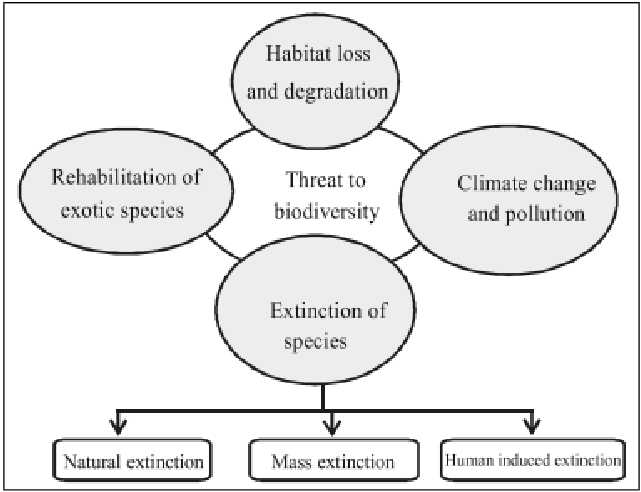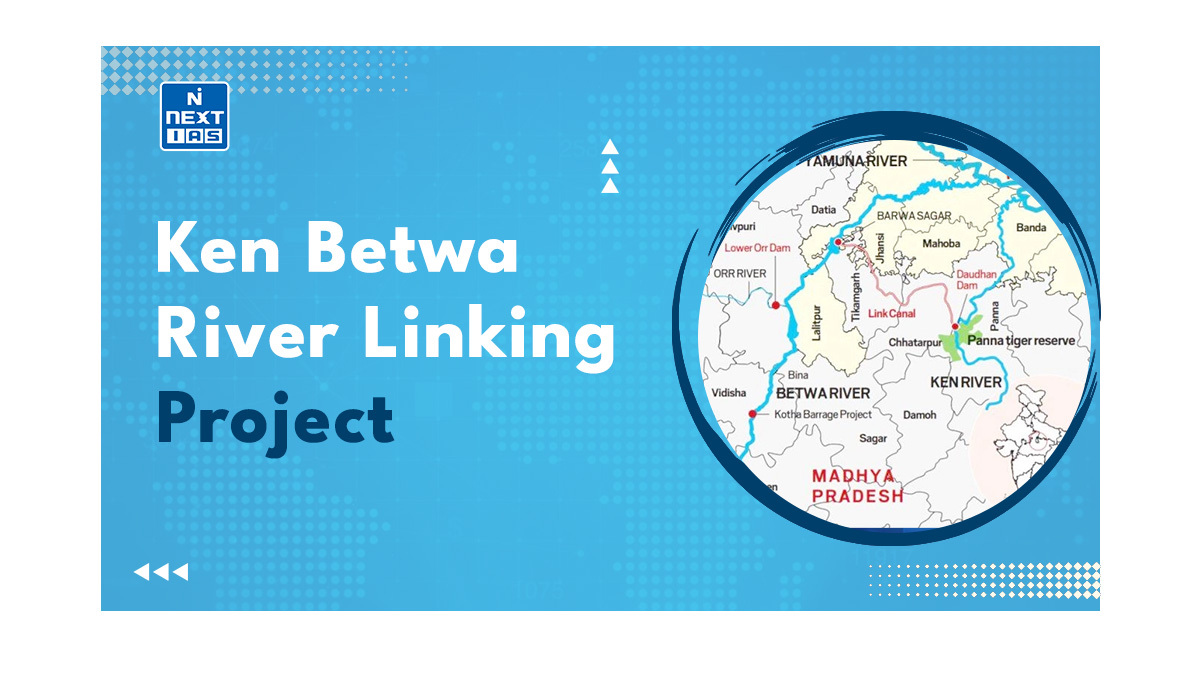
Biodiversity Loss, or Loss of Biodiversity, poses a significant threat to the health of the planet and human societies. It undermines ecosystem services, food security, health, economies, and cultural heritage. This article aims to study in detail the concept of Biodiversity Loss, its meaning, causes, consequences and other related concepts.
What is Biodiversity Loss?
- Biodiversity Loss refers to the decline or disappearance of biological diversity within a species, ecosystem, geographic area, or on the entire planet.
- In other words, it’s essentially a reduction in the variety of life on Earth.
- For example, at one point in the past, Dinosaurs thrived on the Earth, but today, there are no Dinosaurs left on the planet.
Causes of Biodiversity Loss
Prominent causes of loss of biodiversity can be seen as follows:

- Habitat Destruction: Habitat Destruction happens whenever humans change a landscape and modify the ecosystem that resides there.
- Habitat loss is caused by deforestation, mining, industrial expansion, overpopulation, pollution and global warming.
- For example, the destruction of elephant corridors in the Chotanagpur region was caused by extensive mining.
- Invasive Species Introductions: Invasive species compete for food with the native species and also alter the structure of the habitat, threatening natives species.
- For example: Lantana camara, Water hyacinth proliferation in the water bodies of Assam.
- Climate Change: Changes in climate have altered life on Earth.
- Ecosystems have come and gone, and species routinely go extinct. But rapid, manmade climate change speeds up the process without affording ecosystems and species the time to adapt.
- Consequently, many species are not able to cope, causing them to die out.
- For example: Ocean acidification results in coral bleaching.
- Overexploitation of Resources: Activities like over hunting, overfishing and over-harvesting contribute greatly to the loss of biodiversity, killing off numerous species over the past several hundred years.
- Similarly, poaching and other forms of hunting for profit increase the risk of extinction, the extinction of an apex predator or, a predator at the top of a food chain can result in catastrophic consequences for ecosystems.
- Pollution: Pollution is a major threat to biodiversity.
- Industrial, agricultural and waste-based pollutants can have catastrophic effects on many species.
- Apart from habitat destruction, pollution poses long-term cumulative impacts on the species’ health, contributing to their eventual death.
- For instance, marine and freshwater life forms are most affected by pollution.
- For example, Thermal power plants discharge the high temperature coolant water into the marine region, causing thermal pollution in marine ecosystem.
Consequences of Biodiversity Loss
Some of the major effects of loss of biodiversity can be seen as follows:
- Ecological Cost: It has adverse effects on the climate, natural resources, pollution, our health, poverty and the extinction of species.
- According to the IUCN Red List, 784 species have gone extinct in the past five hundred years.
- Economic Cost: In terms of ecosystem services, functions like pollination, soil reclamation, irrigation, and other things would have to be paid for if nature couldn’t take care of them on its own.
- The value of global biodiversity has been estimated to be trillions of dollars.
- Reduced Food Security: Biodiversity is essential for food security and nutrition.
- With the erosion of biodiversity, ecosystems lose the potential to adapt to new challenges, such as climate change and population growth.
- Ensuring food security for all is closely linked to the maintenance of biodiversity.
- Increased Contact with Disease: The loss of biodiversity has significant impacts on human health and the spread of disease.
- Loss of Livelihoods: From fishermen to farmers, biodiversity not to mention healthy ecosystems – is essential for maintaining livelihoods.
- For example, when ocean ecosystems collapse, the entire communities built on the bounty they provide fold as well.
- Whether the cause is pollution, overfishing, ocean acidification, or a combination of these and more, humans are tied to the downfall of the ecosystems that surround them.
Conservation of Biodiversity
- Conservation of Biodiversity or Biodiversity Conservation refers to the protection, preservation, management, or restoration of wildlife and their natural habitats, such as forests and water.
- The survival of many species and habitats, that are threatened due to human activities, can be ensured through the conservation of biodiversity.
- Various methods under the two categories (In-Situ Conservation and Ex-Situ Conservation) are employed for biodiversity conservation.
Read our detailed article on:
Conclusion
Biodiversity Loss, or Loss of Biodiversity, is a complex and pressing global challenge. It has negative repercussions on a wide range of human and ecological areas. Urgent and concerted efforts are needed to halt and reverse the loss of biodiversity through sustainable practices.
Sixth Mass Extinction
- Human activity is causing plants and animals to go extinct at rapid rates and causing the ranges of other species to be drastically reduced.
- By some estimates, the rate of extinction is now many times greater than the natural rate because of anthropogenic activities and the associated climate changes.
- Due to these losses, the present time is often called “The Sixth Mass Extinction”.
Frequently Asked Questions (FAQs)
Why is loss of biodiversity a concern in an ecosystem?
The loss of biodiversity is a significant concern in an ecosystem because it undermines its stability, resilience, and functionality.
How could the loss of biodiversity affect humans?
The loss of biodiversity can have profound and far-reaching effects on humans through adverse impacts on food security, health, economy, etc.
How can we stop biodiversity loss?
Stopping the loss of biodiversity requires a multifaceted approach that involves biodiversity conservation efforts, sustainable practices, policy changes, and public awareness.





